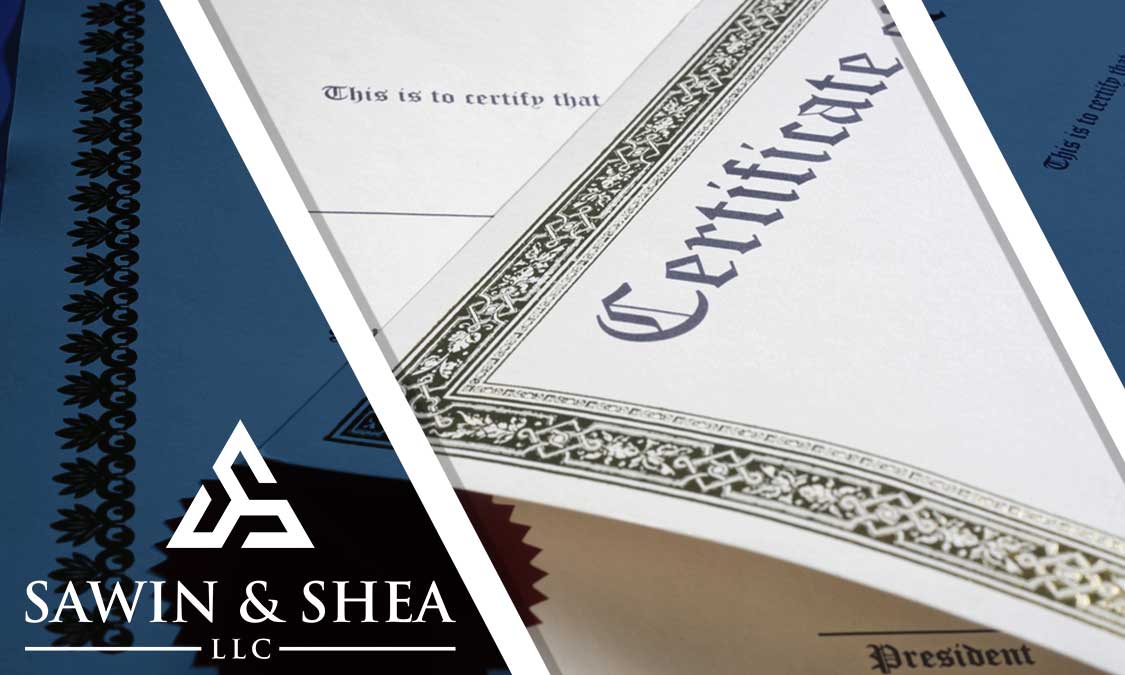Filing for bankruptcy is a great financial option for those struggling with cumbersome debt. It enables you to discharge eligible debts, such as credit card and medical debt, so that you can live with a fresh start in the future. But you may be wondering, “What Is the Impact of Bankruptcy on Professional Licenses and Certifications?”
This debt relief option is the best choice for numerous indebted individuals, and it shouldn’t merely be considered a last resort — It’s a proactive solution that can help you regain financial stability.
Although there’s no reason to feel ashamed for filing, many hold negative beliefs about personal bankruptcy, and they make wrongful assumptions about those who file.
Due to the negative perceptions of bankruptcy, many professionals worry about whether bankruptcy affects their ability to retain professional licenses and certifications. They also wonder how their filing may impact future employment opportunities and their standing with employers.
In this blog, we discuss how Chapter 7 and Chapter 13 bankruptcy, when filed, can affect professional licenses, certifications, your job, and prospective employment opportunities.
How Will Filing Bankruptcy Impact My Professional License?

The short answer is that filing bankruptcy should NOT impact your current professional licenses or certifications. Federal law protects those who file against discrimination, and this includes having your license revoked.
Bankruptcy Code Section 525(a) states that:

“…a governmental unit may not deny, revoke, suspend, or refuse a license, permit, charter, franchise, or other similar grant to…a person that is or has been a debtor under this title or a bankrupt or a debtor under the Bankruptcy Act.”
Your bankruptcy alone shouldn’t affect your professional license, but you may need to report that you declared bankruptcy, depending on your type of license or certification. Ensure you research whether you’re obligated to report your bankruptcy before filing or reach out to an experienced bankruptcy attorney to assist you.
Will Bankruptcy Affect My Ability to Obtain a New License or Certification?
If you file bankruptcy, it could determine your ability to obtain a new professional license. Bankruptcy alone shouldn’t determine whether or not you get or lose the license, but the licensing board or state board will evaluate you holistically. During that process, they may consider your finances, missed payments, and credit, especially if your career requires you to handle money.
Again, bankruptcy shouldn’t be the sole factor in determining whether an applicant can obtain a professional license, but a poor credit report can negatively affect an applicant’s chances. An applicant’s bankruptcy and credit check may also reveal serious issues that may impact their license status, such as fraud.
Professional Licenses and Loan Defaults

While a bankruptcy filing alone shouldn’t ruin your chances of obtaining a license, defaulting on certain loans and debts can. In fact, defaulting may even jeopardize your current license status.
Types of loan and debt defaults that may affect your professional license include:
- Child support
- Student loans
- Alimony
Can My Bankruptcy Filing Affect My Employment?
It is against the law for an employer to fire you on the basis of your bankruptcy, and this includes both government and private employers. Additionally, the Bankruptcy Code states that it’s illegal for employers to demote you or reduce your pay or responsibilities because of your bankruptcy.
If you suspect that you’ve been fired or demoted due to your bankruptcy, you should contact a labor attorney to assist you, as there’s no excuse for workplace discrimination.
While bankruptcy laws prohibit an employer from treating an employee differently, your bankruptcy case may still impact your employment, depending on your profession.
For example, lawyers and real estate agents may be prohibited from holding money or assets on behalf of clients while undergoing bankruptcy and fulfilling financial obligations. That said, these limitations are temporary.
Additionally, bankruptcy may indicate other financial problems that can impact your status with your employer, such as fraud or defaulting on certain loans.
Your employer cannot reduce your pay or fire you because you filed bankruptcy, but they can fire you for fraud, defaulting, and bad credit, especially if you’re responsible for handling money.
Will My Current Employer Find Out About My Bankruptcy?
While you can rest assured that you won’t be fired if you file for bankruptcy, you may still worry that your employer and co-workers will lose respect for you. Again, there’s no reason to feel ashamed if you file for bankruptcy, but it’s understandable to care what others think.
Fortunately, it’s unlikely that your office or other workplace will learn that you filed bankruptcy. You’re under no obligation to disclose your bankruptcy to your company. In most cases, they will not find out.
That said, there are some situations in which your office could learn of your bankruptcy. For example, if your salary payments were garnished to repay creditors, your bankruptcy will halt the garnishment. Your employer will be notified of the bankruptcy in order to stop the wage garnishment.
Additionally, your employer could find out if they run a credit check on you, but they need to receive your permission to check your credit. Further, your employer could require you to receive a new security clearance, and they will likely discover that you filed bankruptcy during that process.
Can Bankruptcy Affect My Future Job Prospects?
Filing bankruptcy can impact your employment opportunities. Bankruptcy laws state that public employers cannot take your bankruptcy into consideration during the hiring process. As we’ve discussed, there may be other reasons related to your bankruptcy that could impact your job application with a public employer — such as defaulting on student loan debt — but the bankruptcy alone shouldn’t compromise your application.
While public employers cannot consider bankruptcy filings when deciding whether to hire you, the law does not apply to private employers. If you apply for a job with a private company, the prospective employer may decide to deny you due to your bankruptcy. Unfortunately, this can cause you to lose potential opportunities, especially if your career involves finances or accounting.
Some of the ways in which private employers discover bankruptcy filings include security clearance background checks and credit checks. Additionally, they can search for your bankruptcy since it’s part of the public record. If your job application requires you to undergo a background or credit check, it’s best to inform the company that you’ve filed.
File Bankruptcy with the Help of an Experienced Lawyer
If you’re considering filing for bankruptcy, it’s best to work with an attorney to help you with your case. For Chapter 13 and Chapter 7 attorneys in Indiana, contact Sawin & Shea, LLC.
Our attorneys have years of experience assisting Indiana professionals through the bankruptcy process, and we can help you get your finances back on track.You can schedule a FREE case consultation today online or by calling 317-759-1483.



